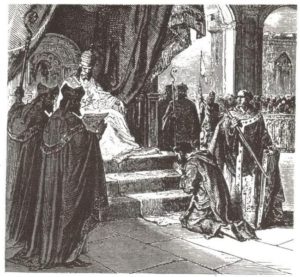– For the context of these translations click here –
Louis the Pious had his enemies’ eyes gouged out and made a public confession of his sins
The first rebellion against Louis’ new order, which was to ensure the unity of the Empire and the Church, of the throne and the altar, came from Bernard of Italy. The only son of King Pippin, the predator of the Avars’ treasure, educated after his father’s death (810) in the monastery of Fulda, officially adopted the title of ‘king of the Longboards’ after the imperial assembly of Aachen (September 813).
When, under the Ordinatio Imperii, he had to submit to Lothair I, son of Louis, as he had previously submitted to his grandfather Charlemagne and Emperor Louis, he rebelled with numerous magnates of his kingdom. The sources are unanimous in stating that this initiative did not come from the young sovereign, who was then in his early twenties, but from his advisors.
A few months after the publication of the Ordinatio Imperii of 817, Bernard, together with ‘some wicked men’ (Annales regni Francorum)—including the court poet Bishop Theodulf of Orleans, Bishops Anselm of Milan and Wolfold of Cremona, as well as some abbots, according to an ancient source—mounted an uprising which was widespread but poorly organised. The aim was to dethrone Louis and put Bernard in his place. But everything suggests that it was not so much a question of dethroning as of ensuring the continued existence of Bernard’s small kingdom.
The emperor mobilised large contingents of troops, and demanded that the abbots and abbesses ‘do military service’ because ‘by Satan’s cunning King Bernard had prepared for sedition.’ He set off southwards at full speed and passed over the Alps into Italy. But even before the uprising had properly begun, and without even having crossed swords, Bernard appeared with his loyalists at Chalon-sur-Saône, apparently of his own free will. He laid down his arms and threw himself at the emperor’s feet. Bernard’s great ones acted similarly, who ‘as soon as the first interrogation began, they openly and motu proprio declared the whole course of the affair’.
In vain. Louis had them arrested, sent them to Aachen and there, in the spring of 818, during the imperial assembly, in a delicate manner—as the imperial analyst repeats—and only after ‘the fasting time of Lent had passed’ he had them sentenced to death, at least all those considered civilians, and then ‘pardoned’ the death penalty by the cruel punishment of plucking out their eyes. ‘They were simply deprived of their sight’ which was ‘legally irreproachable’ (Boshof).
King Bernard, whom Louis had earlier called his son, and who in turn had just fathered a child named after his grandfather Pippin, was severely punished. He died with his eye sockets emptied ‘notwithstanding the emperor’s clement manner,’ two days later, on 17 April 818. His treasurer and advisor Reginhard, as well as Reginhar, the grandson of a Thuringian rebel against Charlemagne, also defended themselves and succumbed to the terrible procedure, for ‘not having endured with sufficient patience to have their eyes gouged out’ (Anonymi vita Hludovici).
Louis penitent in Attigny
In August 822 Louis made a public confession of his faults at the imperial diet of Attigny. He regretted his crime against his young nephew Bernard, who died miserably; he regretted the hardness of his heart against his little half-brothers, on whom he imposed the clerical tonsure, and against Adalhard and Wala, his father’s cousins. This was a singular procedure in the history of the Franks, a humiliation of the emperor by the clergy, behind which were perhaps in a very special way Charlemagne’s cousins who had been deeply humiliated in the past.
